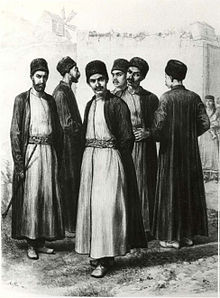クリミア・カライム人
表示
 19世紀のクリミア半島の伝統的な衣装を着たカライム人の男性。 | |
| 総人口 | |
|---|---|
| ≈2,500 | |
| 1,196[1] | |
| | 715[2] |
| ~500[3] | |
| 346[4] | |
| 241[5] | |
| 205[6] | |
| 言語 | |
| カライム語, リトアニア語, ポーランド語, ロシア語, ルーマニア語 | |
| 宗教 | |
| ユダヤ教カライ派, キリスト教[7][8] | |
クリミア・カライム人(Crimean KaraitesまたはKrymkaraylar)は、カライム語を話すテュルク系民族である。
起源
[編集]チュルク語を話すカライム人は、何世紀にもわたってクリミアに住んできた。その起源は大きな論争の的である。ほとんどの現代科学者[9][10]は、彼らをクリミアに定住し、キプチャクの言語を採用したカライ派ユダヤ人の子孫と見なしている。一方で、彼らをカライ派ユダヤ教に改宗したハザール人、クマン人またはキプチャクの子孫と見なしている人もいる[11]。多くのクリミア・カライ人はセム族(ユダヤ人)の起源説を拒否しており、ハザール人の子孫であると認識している[12]。ハザールの歴史の専門家の中には、カライムのハザール起源説に疑問を呈する人もいる[13][14]。
脚注
[編集]- ^ 1,196 Karaites in the Ukraine as a whole (including the Crimea) Распределение населения по национальности и родному языку УКРАИНА Distribution of the population by nationality and mother tongue, Ukraine (Russian language version)
- ^ Population in Autonomous Republic of the Crimea = 671, population in Sevastopol city council area = 44. 671+44 = 715. Распределение населения по национальности и родному языку, Автономная Республика Крым (Distribution of the population by nationality and mother tongue, Autonomous Republic of the Crimea )
Распределение населения по национальности и родному языку, Г.Севастополь (горсовет) (Distribution of the population by nationality and mother tongue, Sevastopol city council) - ^ The Karaites of Galicia : an ethnoreligious minority among the Ashkenazim, the Turks, and the Slavs, 1772-1945. Brill. (2008). ISBN 978-90-47-44288-2
- ^ Ludność. Stan i struktura demograficzno-społeczna.Narodowy Spis Powszechny Ludności i Mieszkań 2011.
- ^ “Gyventojai pagal tautybę, gimtąją kalbą ir tikybą”. Statistics Lithuania. January 9, 2015閲覧。
- ^ Russian Census 2010: Population by ethnicity Archived April 24, 2012, at the Wayback Machine.
- ^ Album "Archive of the Dmitri Penbeck’s family" – compiled by V. Penbek — Simferopol-Slippery Rock, 2004. — C. 24
- ^ Кропотов В. С. Военные традиции крымских караимов — Симферополь, 2004. — C. 75
- ^ "The first direction that dominates present-day scientific circles says the Karaites are Jews both in the religious and the ethnic respect. Representatives of the second direction claim that ethnically Karaites are not Jewish but descendants of the Khazars, Polovets, and other Turkic nations. In the opinion of the followers of this theory, the Karaites have their own religion based upon ancient Turkic beliefs that have only indirect relation to Judaism. …" T.Schegoleva Karaites of Crimea: History and Present-Day Situation in Community
- ^ "The second avenue of approach, which, due to the specificity of the activities of Karaite community, is mostly supported by researchers in Eastern Europe, is related with the transformation of Karaite identity. Researchers tend to accept the theory of Karaite Khazarian origins, and apply it in their studies.Because of its limitations — the critical application of this approach to the Karaites history before the 20th c. is logically almost impossible — the Karaite studies are not sufficiently developed in this region. And in the last decades this approach attracts even less adherents — with an exception of more of descriptive nature, journalistic initiatives, which are supported by Lithuanian Karaite community. While the Khazarian approach is rather critically assessed by the academic community» Dovile Troskovaite.Identity in Transition: The Case of Polish Karaites in the first half of the 20th century.//University of Klaipeda (Lithuania) 2013 p. 210
- ^ See e.g Inscription in Khazarian Rovas script
- ^ Blady, Ken. Jewish Communities in Exotic Places. Northvale, N.J.: Jason Aronson Inc., 2000. pp. 115–130.
- ^ Golden, Peter B. (2007a). "Khazar Studies: Achievements and Perspectives". In Golden, Peter B.; Ben-Shammai, Haggai; Róna-Tas, András (eds.). The World of the Khazars: New Perspectives. Handbook of Oriental Studies. Vol. 17. BRILL. pp. 7–57. ISBN 978-9-004-16042-2. 2013年2月13日閲覧。 ,p.9
- ^ Brook, Kevin Alan. The Jews of Khazaria. 3rd ed. Rowman & Littlefield Publishers, Inc, 2018. p. 211–213, 215–216.
